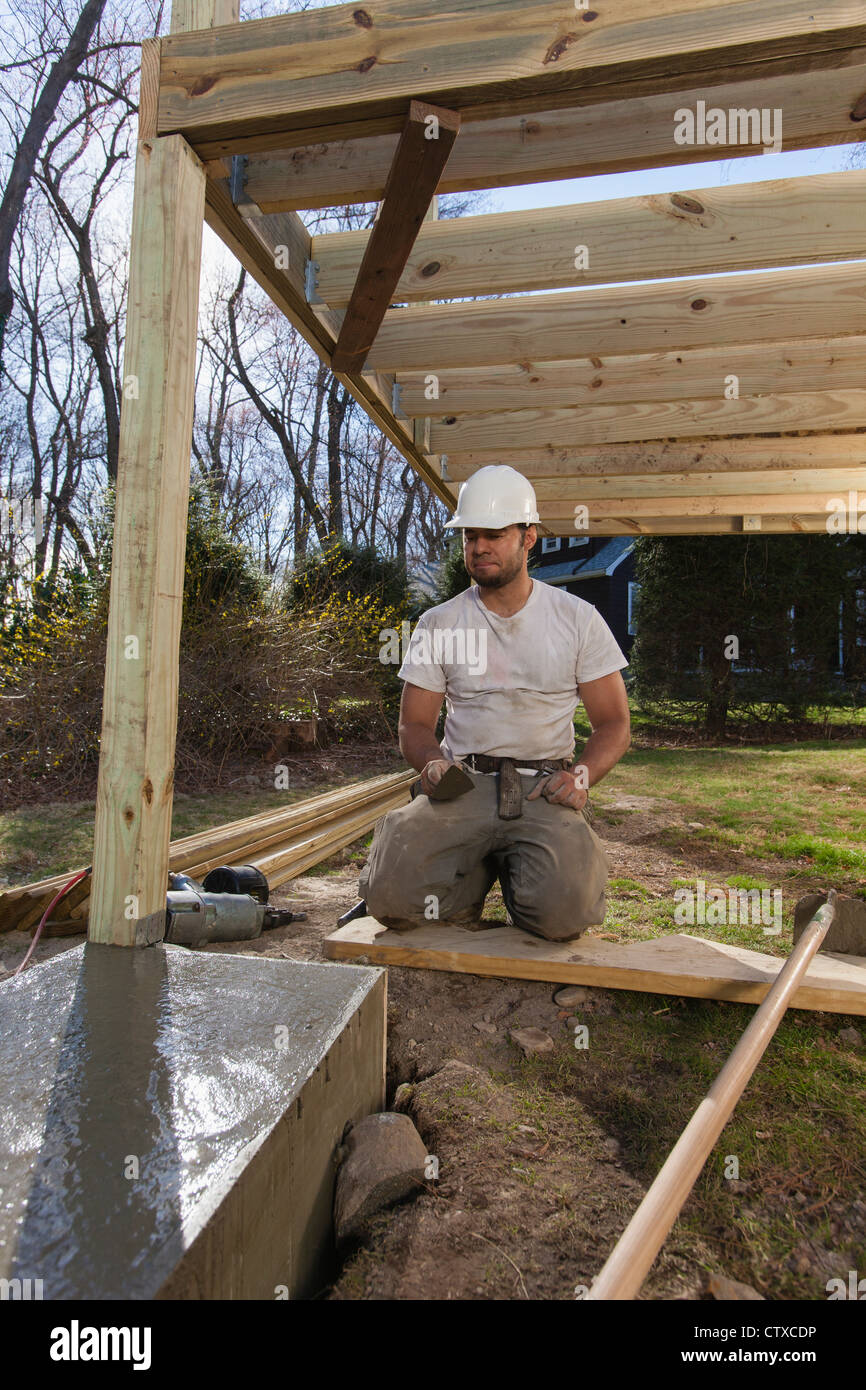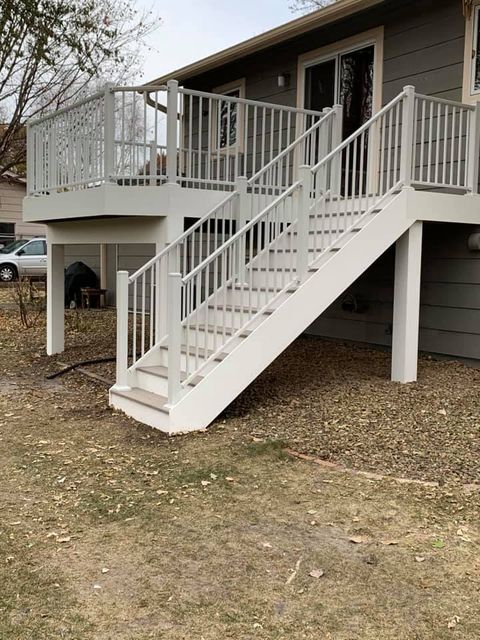Choosing the Right Deck Footings for Stability and Toughness
When it concerns constructing a deck, among the most vital choices you will make is selecting the ideal grounds for stability and toughness. The durability and safety of your deck depend greatly on the kind of footings you select, as they offer the important support and security to endure the test of time. With a myriad of alternatives readily available, it can be frustrating to figure out which grounds are best matched for your specific needs. In this discussion, we will certainly explore the numerous sorts of deck grounds, consider the essential elements to weigh when deciding, and look into the benefits and drawbacks of various options. By the end, you will have a clearer understanding of the options at hand and be far better equipped to make an educated decision for your deck project.
Kinds Of Deck Grounds
These grounds are composed of a cylindrical opening filled up with concrete, which provides a solid structure for the deck blog posts. Concrete pier grounds are fairly simple to mount and use exceptional security, making them a popular choice for numerous deck jobs.
These footings are installed by screwing them right into the ground, which creates a secure foundation for the deck. They likewise permit for easy modification and leveling of the deck if required.
Additionally, some contractors decide for precast concrete grounds. These footings are made of sturdy concrete and come in numerous sizes and shapes to suit different deck designs. Precast concrete grounds are practical to set up and supply a secure base for the deck framework.
Ultimately, one more option is the post-in-anchor footing system. This type of ground involves driving a steel anchor into the ground and affixing it to the deck blog post. It uses adaptability in regards to positioning the deck articles and is ideal for decks with light-weight structures.
When selecting the appropriate sort of deck footing, it is necessary to think about variables such as dirt problems, deck tons, and neighborhood building ordinance (Deck Footings). Consulting with an expert specialist or structural designer can assist make sure the appropriate ground is chosen for a risk-free and stable deck
Variables to Think About When Picking Grounds
When picking the ideal footings for a deck, it is critical to very carefully consider different factors such as soil problems, deck load, and adherence to regional building ordinance. These variables play a substantial duty in ensuring the security and longevity of the deck structure.
Among the primary factors to think about is the soil conditions. The kind of dirt on which the deck will certainly be constructed establishes the sort of footings required. For circumstances, decks developed on loose or sandy soils may call for much deeper footings to provide appropriate support and prevent settling. On the other hand, decks developed on clay or large soils might require footings that can accommodate the soil's propensity to increase and agreement.
Another essential variable is the deck load. The weight of the deck, including the materials used and any type of possible real-time lots such as furnishings or events, should be thought about when picking grounds. The footings must be developed to bear the weight of the deck and distribute it uniformly to protect against any structural concerns or failings.
Lastly, adherence to neighborhood building codes is paramount. Building regulations differ from area to region, and it is vital to conform with the specific requirements established by the neighborhood authorities. Deck Footings. These codes make certain that the deck is constructed safely and satisfies the needed requirements for architectural honesty and load-bearing capacity
Concrete Footings: Disadvantages and pros

Concrete footings supply several benefits and drawbacks when made use of as the foundation for a deck. On the positive side, concrete grounds provide excellent stability and toughness.
Another benefit of concrete footings is their flexibility. They can be poured into different sizes and shapes to suit various deck designs and configurations. Concrete footings can be customized to fit the specific requirements and requirements of the deck framework.
However, there are additionally some downsides to using concrete footings. This can increase the total cost of the deck project and might call for specialist help.

Helical Piers Vs. Sonotubes: Which Is Much better?
In taking into consideration the foundation alternatives for a deck, the contrast in between helical piers and sonotubes is essential in figuring out the exceptional selection. Helical piers, also called screw stacks, are steel shafts with helical plates affixed to them. They are twisted right into the ground utilizing hydraulic equipment, offering a long lasting and stable foundation for the deck. On the various other hand, sonotubes are round forms made of cardboard or fiber product that are full of concrete. They are put in an opening explored the ground and supply support for the deck.
The helical plates on the piers develop a strong hold with the soil, protecting against any visite site motion or changing of the deck. Sonotubes, on the various other hand, depend only on the concrete filling up for security, which may not use the very same degree of toughness and resistance.
In regards to setup, helical piers are reasonably much easier and faster to mount contrasted to sonotubes. The hydraulic machinery used to twist the piers into the ground guarantees a quick and reliable procedure. Sonotubes, on the other hand, call for excavating holes and pouring concrete, which can be time-consuming and labor-intensive.
In addition, helical piers are an even more functional choice. If needed, they can be utilized in different soil problems and can be adjusted or enhanced. Sonotubes, on the navigate to this website other hand, might require extra support, such as rebar, in particular dirt problems or areas with high lots demands.
Picking the Right Footings for Your Deck's Measurements
For optimal architectural stability, it is important to meticulously pick the suitable grounds that line up with the measurements of your deck. The dimensions of your deck, including its length, width, and height, play a significant function in establishing the type and size of grounds called for.
When choosing footings for your deck, it is essential to consider the load-bearing capacity of the dirt. The weight of the deck, integrated with the weight of any type of furniture or individuals on it, applies a considerable force on the footings (Deck Footings). It is vital to select footings that can properly support this weight without sinking or moving over time.
The shapes and size of the footings must additionally be taken into consideration. Larger decks with higher dimensions need larger grounds news to supply adequate stability and support. The form of the grounds, whether they are rounded or square, depends on the design and format of the deck. Additionally, the deepness at which the footings are set up need to be identified based upon the frost line in your area to stop any kind of heaving or shifting due to freezing temperatures.
Final Thought
In conclusion, picking the ideal deck footings is vital for making sure stability and sturdiness. Factors such as the type of footings, the deck's measurements, and the pros and disadvantages of different alternatives should be thought about.
These footings are composed of a cylindrical opening loaded with concrete, which supplies a solid foundation for the deck articles. Concrete pier grounds are fairly simple to install and offer superb stability, making them a prominent choice for lots of deck projects.
Precast concrete grounds are hassle-free to install and supply a secure base for the deck framework.
It offers versatility in terms of placing the deck posts and is suitable for decks with lightweight frameworks.
Concrete footings offer a number of advantages and disadvantages when made use of as the foundation for a deck.